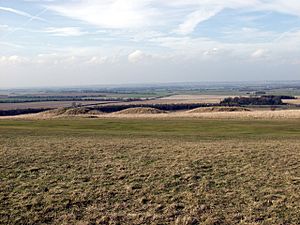Therfield Heath facts for kids
| Site of Special Scientific Interest | |

The open country of the Heath
|
|
| Area of Search | Hertfordshire |
|---|---|
| Interest | Biological |
| Area | 143.3 hectares |
| Notification | 1984 |
| Location map | Magic Map |
Therfield Heath is a special natural area in Hertfordshire, England. It is known as a Site of Special Scientific Interest (SSSI) because of its important plants and animals. It's also a Local Nature Reserve, which means it's protected for nature and for people to enjoy.
The Heath is located on a chalky hill just north of the village of Therfield. Because it's also south-west of the town of Royston, many local people call it Royston Heath. This land is a "common," which means it has been used by local people for a long time. Even today, sheep still graze here regularly, helping to keep the grass short and healthy for wildflowers. From the Heath, you can see amazing views looking north, all the way over the valley of the River Cam towards the city of Cambridge.
Contents
Ancient History of Therfield Heath
Therfield Heath is not just beautiful; it's also full of history! You can find very old burial mounds here.
Neolithic and Bronze Age Burials
- Long Barrow: There is a very old burial mound called a long barrow on the Heath. Experts believe it was built during the Neolithic period, which was a time when people first started farming, thousands of years ago.
- Round Barrows: You can also see several round barrows here. These are smaller, circular mounds that were used for burials during the Bronze Age. This was a time when people started using bronze tools and weapons.
Scheduled Ancient Monuments
All these ancient burial sites are protected by English Heritage. They are called scheduled ancient monuments. This means they are very important historical places that must be preserved. The group of round barrows on Therfield Heath is the biggest one of its kind known in all of Hertfordshire!
Royal Connections
It is said that King James I really liked Therfield Heath. He reportedly used it as a place to hunt. King James I ruled both Scotland and England in the early 1600s.
Exploring Therfield Hill
The highest part of Therfield Heath is called Therfield Hill.
Height and Views
Therfield Hill reaches a height of 168 meters (about 551 feet). It's the highest point for many miles around, offering incredible panoramic views. You can see far into the distance in every direction.
Water Tower Landmark
At the very top of Therfield Hill, there is a water tower. This tower is a clear landmark that helps people find the highest point.
Pasqueflowers on Church Hill
Another interesting spot on the Heath is Church Hill. This area is famous for its many rare pasqueflowers. These beautiful purple flowers bloom in early spring, making the hillside look very special.
How to Visit Therfield Heath
You can easily get to Therfield Heath from Baldock Road. It's a great place to explore nature, learn about history, and enjoy the outdoors.
 | Toni Morrison |
 | Barack Obama |
 | Martin Luther King Jr. |
 | Ralph Bunche |

